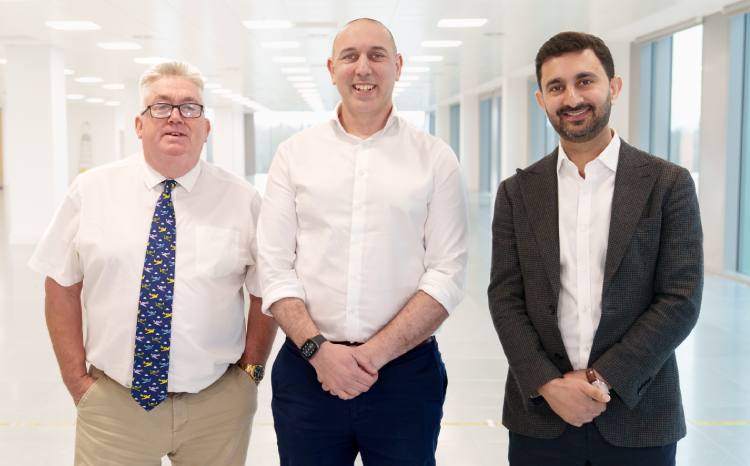CCIO profile: Dr Tony Shannon
- 4 September 2012

Dr Tony Shannon has been an IT enthusiast since first being introduced to computers as a boy growing up in Ireland.
Coming from a “very medical family”, he was “kind of always going to assume a medical career”, but was also keen to pursue his interest in IT in medicine.
After finishing medical school in Dublin, he was in for a rude shock when he entered the NHS and found everything being done on pen and paper.
IT fan meets pen and paper
“I was interested in IT from being a young boy,” he says. “Yet as I became a doctor and started to practice I realised that although the internet was beginning, there was nothing happening in hospitals.
“There was just a massive gap between my personal knowledge of IT and the front line. I see medicine as a very information intensive discipline.
“You are basically gathering information and assimilating information. Analysing information is the major part of our role.
“I don’t think a lot of clinicians see it that way, but I do – and I’m always frustrated by the poor and insufficient way we have of dealing with information.”
Dr Shannon came to the UK to train in emergency medicine 15 years ago. While working in the North of England in 1998, he set up a website for trainee emergency medics as a place to record their training programme and access other useful material.
He also developed a drug calculator that made it four times faster – and “much safer” – to calculate dosages, which, he says, made him “aware that you could achieve useful results with small applications in a small team.”
However, Dr Shannon says he found it difficult to pursue his IT interests in the UK. So he jumped at the chance to travel to the United States for an informatics fellowship at Washington Hospital Centre.
There, he worked with a small band of emergency medicine physicians with qualifications in computer science. He spent a year honing his skills, doing the coding and programming for a mobile electronic health record.
“It was a fantastic experience but only lasted a year,” he recalls. “It was a very influential year. They were certainly well ahead of their time. I came back having learned a whole lot. That year energised me and energises me still.”
Working within NPfIT
Dr Shannon returned to the UK to find the National Programme for IT in the NHS getting under way. He decided to try and influence what was happening and got involved in assessing bids for national programme contracts.
In 2003, he entered a full time masters degree in IT management; continuing with his medical work at weekends.
“That led to concern about the way the national programme was being setup; it just didn’t’ fit with good practice in my mind at the time,” he says.
“Culturally, the NHS hasn’t shifted much off the national programme. It hasn’t learned the lessons well enough yet; it is just too slow to change.”
However, rather than simply criticising, Dr Shannon decided to remain involved and “influence things for the better.”
With this in mind, he joined NHS Connecting for Health in 2004, moving to Leeds and, at the same time, starting work in the emergency department at Leeds Teaching Hospitals NHS Trust.
“I tried to influence from within; but there were many challenges with the people, process and technology,” he explains.
“Healthcare in the NHS is a complex system and that means you need to get the people working in it to improve their processes with technology; but I don’t think that mindset pervades the NHS. It’s still clinicians in one camp and IT in another.”
Dr Shannon has no doubt that the sorts of changes needed should only be led by clinicians. “If doctors aren’t bought in you struggle to get effective change.”
Unsurprisingly, he says that although he can point to work that he did with CfH that remains useful now, he “got stuck” when it came to implementing good practice.
Five years after he joined it, a change of leadership at the trust meant he was asked to take on a role that was effectively a chief clinical information officer, but called clinical lead for informatics. He left the frustration of CfH and took up the position.
Leading IT in Leeds
In his CCIO role, Dr Shannon has helped to shape the trust’s informatics strategy, which was recently backed by the board with an investment of £37m over five years.
As a great proponent of open source software, he has also worked to develop an open source clinical portal that is being used in A&E and oncology.
This allows clinicians to see patient demographics pulled from the patient administration system, admissions and discharges, clinical letters, lab results and x-rays and referrals. It has been rolled out to about 200 users so far from a trust workforce of several thousand.
“It’s in slow but steady use,” Dr Shannon says. “It’s not taken over the whole hospital by any means; it’s basically used regularly by a significant proportion of the users on a semi-daily basis. But if you are a medical doctor it makes a tremendous difference.”
The clinical coding team is also using the portal and Dr Shannon says he is trying to create a pull effect from within the hospital, so that other areas demand access, instead of having it imposed on them.
This is where a role like his comes in handy and, more recently, he has been asked to extend it across the city, taking in health and social care, as well as the acute sector.
Many different skills needed
Dr Shannon believes a CCIO needs to have a clinical background, a good understanding of business processes and management, and a grounding in technology.
“To be most effective you need all three,” he says. “There are very few out there who have got the right background – probably because medical informatics is such an immature science.”
He hopes many more CCIOs are appointed, but is not sure this is high on most trusts’ radars at the moment.
“It needs to come from people like myself who push it up to board level to say: ‘I’m here, I’m around, how can I help?’”




